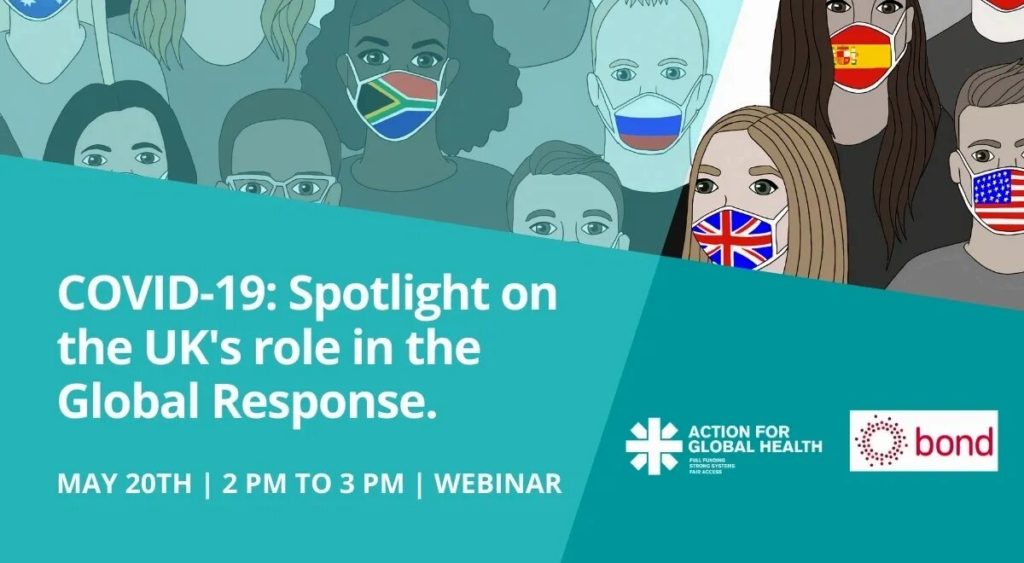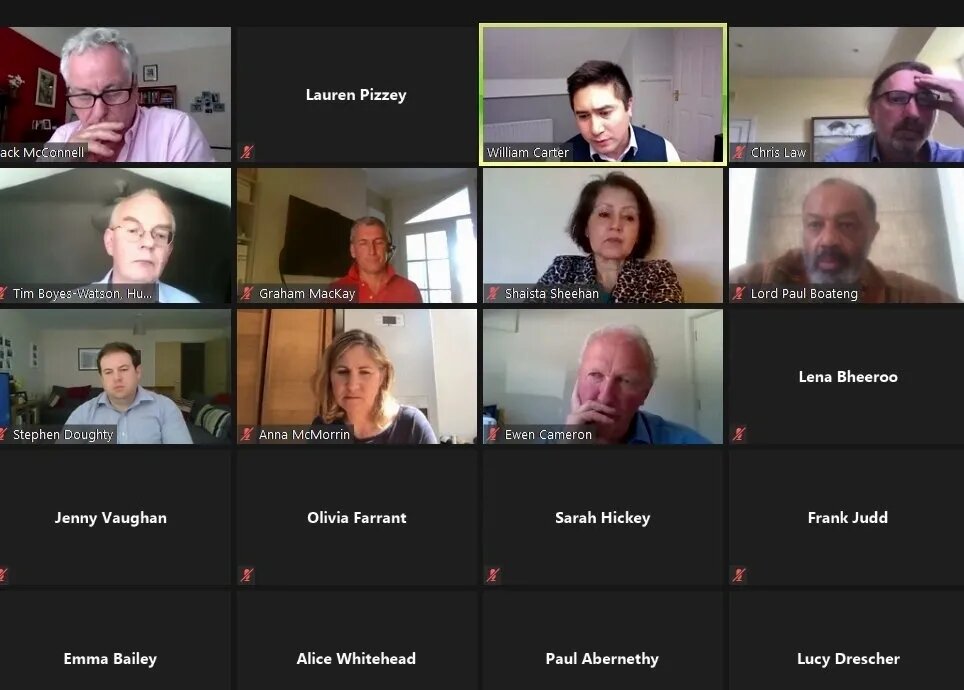COVID19: Spotlight on the UK’s role in the Global Response

Webinar, May 20th, 2020 – Action for Global Health and Bond brought together parliamentarians and speakers working across different components of the international response to COVID-19 to discuss what the UK can do to help combat the virus and truly leave no one behind.
Speakers included Emma Bailey (Clinical Lead, King’s Global Health Partnerships, Sierra Leone), Will Carter (Operational Lead for Covid-19, Norwegian Refugee Council UK), Tim Boyes-Watson (Director, Humentum) and Sandra Martinsone (Policy Manager, Bond). The event was kindly chaired by Lord McConnell of Glenscorrodale (co-chair of the APPG on the UN SDGs).
The virtual event, COVID19: Spotlight on the UK’s role in the Global Response took place against a backdrop of growing concerns that the consequences of the pandemic will severely undermine progress towards the Sustainable Development Goals (SGDs) and have lasting impact on development outcomes globally.
Speaking on her experience leading a COVID-19 clinical response effort at Connaught Hospital in Sierra Leone where the doctor to patient ratio is just 3 to 100,000, Emma Bailey gave a window into life and work on the frontline. “Due to fear about the stigma of COVID, concerns about health facilities and confused public messaging, patients presenting with COVID here are coming very late and very sick”, Emma said. “Those outside of the few treatment centres are having to pay for COVID/+non-COVID care which creates huge inequalities in what care they receive. Many already have financial difficulties and are considered destitute”.

The worldwide response to COVID19 will require the Department for International Development (DFID) to take a leading role in coordination efforts and making substantial funding available at the local level to protect vulnerable groups. Unless urgent action is taken, the pandemic will continue to devastate already stretched health systems, overwhelm social safety nets, and exacerbate inequalities.
“We are not all in this together when it comes to how the impacts of this crisis are felt”, said Sandra Martinsone. “It is increasing inequality among people and countries with the most vulnerable groups – the elderly, women, refugees, displaced, the poor, illegal and legal migrants, disabled, informal workers, minorities, marginalized communities – taking the biggest hit.” These vulnerabilities were also echoed by Will Carter who spoke about the barriers in reaching and supporting the world’s 71 million displaced people. “Those trapped in conflict zones cannot be properly tested or treated.”, he said. “A second wave of the pandemic is therefore much more likely to emerge from a war zone than a wet market.”
Will and Sandra both urged parliamentarians to consider that the battle doesn’t stop at the virus being defeated. There are other major challenges that need to be addressed simultaneously including, but not limited to, weak and fragile healthcare systems, the consequences of a huge informal economy with no social protection, unsustainable food production and consumption systems, recessions and depression and limited fiscal space for governments to act.
“Reduced capacity of health and humanitarian systems, social effects including fear and xenophobia, and the devastating consequences for food security will also be catastrophic.”, Will said.
Although a pandemic of this size and speed is rare, the world has experience in stamping out horrific diseases. We have eradicated smallpox, nearly wiped out polio, and we are turning the tide against Ebola and malaria. Many international development organisations are already urgently reconfiguring their services to help people in the UK and around the world get access to the healthcare and essentials that they need to cope with the crisis.
Tim Boyes-Watson said, “Civil society reaches where others can’t and works as part of communities to prioritise support for the greatest needs. Involving civil society therefore has the potential to massively improve value for money by better targeting, and through leveraging local partners on the ground, their relationship with national and local governments, and their millions of volunteers and community resources”
“However, the diversity of income streams and lack of dependence on DFID that was once a strength, now leaves UK INGOs facing a rapid and massive decline in unrestricted reserves and cash compared to the US INGO sector.”, Tim said. “A third to a half of the capabilities that UK INGOs have built over 70 years may be swept away in the next year.”
The UK’s abilities and expertise in medical research have been demonstrated in the leadership it has already shown in funding the global fight to find a vaccine. Now, stepping up as a world leader in all areas of the international response will not only save lives here and overseas, but will be critical in shaping the UK’s global role for years to come. It’s vital that it leads as a strong partner with civil society to both eradicate COVID-19 and support a sustainable recovery effort that truly leaves no one behind.
“There is simply no way to go back to normal.”, Sandra Martinsone stressed. “We need a post-Covid world for people and planet.”.
Continue the dialogue on the UK’s role in global heath @AFGHNetwork.
